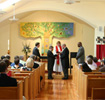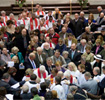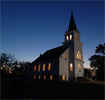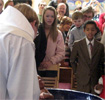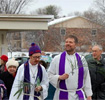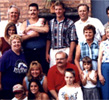
Splitting at the fault lines
Robert Cully
Wyoming, Minn. "It would have been so much easier for us to stay with the status quo and not decide for ourselves to make the change." |
↓ Interview
Robert Cully and his wife used to attend St. Paul Lutheran Church in Wyoming, Minn. -- despite what they felt was an increasing leftward tilt. About two years ago, an ELCA bishop visited their church, and indicated that the church was about ready to deal with the matter of gay pastors serving as clergy. The Cullys stayed, hoping a vote wouldn't come up. But when it did, and when it passed in favor of gay pastors serving as clergy, they'd had enough and left St. Paul Lutheran to find another church. "We never thought that at our age we'd be looking for a new congregation and a new way to serve," Cully says. "But here we are." Now they drive 30 miles to attend a church in Fridley that recently voted to disaffiliate from the ELCA. Cully says the Lutheran Church began with a protest against the ways of the Roman Catholic Church and he feels his move, though small in comparison, is in keeping with that tradition. "Our move is nothing heroic and nothing new," he says. "But it is painful." Their social network centered around the church, and now their friendships are suffering. "We have a lot of really good friends that are members of that congregation and we still see them socially. But it certainly has put a strain on our relationship. It's not easy to make that kind of a break," he says. "It would have been so much easier for us to stay with the status quo and not decide for ourselves to make the change." |
Philip Iversen
Fountain Hills, Ariz. "It was the worst display of Christian disharmony I have ever witnessed. Old friends no longer communicate with each other." |
↓ In their words
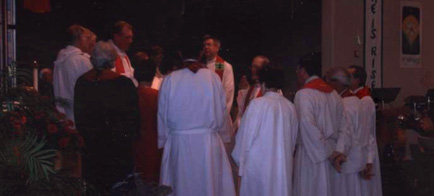 The ordination ceremony for Rev. Chon Pugh, who is helping establish a new ELCA church after Shepherd of the Hills split over the vote. (Photo courtesy of Philip Iversen) Prior to the vote, Philip Iverson attended Shepherd of the Hills in Fountain Hills, Ariz. Iversen says that roughly a third of the congregation left the church to form a new ELCA congregation. The rest scattered to other churches. "It was the worst display of Christian disharmony I have ever witnessed. Old friends no longer communicate with each other. "I don't know what has happened to our former church because even with the few members we still communicate with, the disruption of the congregation is avoided in conversation. However, among the new congregation, of about one hundred members, there is a feeling of unity, satisfaction and progress in the growth and stability of the new church. In the near future we will have a mission pastor and everyone is enthusiastic about that. At the beginning of the controversy I was a bit irritated that the ELCA brought up this divisive issue. However, as discussion evolved into serious debate the anti-ELCA group brought up issues that consolidated my deeper feelings and I switched to strong support for the ELCA. The gay issue had to be dealt with sooner or later and I'm pleased the ELCA faced the challenge—it was the Christian thing to do and we will be a better church for taking the action we did. "We lost a beautiful church and campus many of our members had worked hard and long to establish. The legal methods our anti-ELCA group used were devious and too easy for them to destroy our former church. Church members should have the right to disagree but it should not be so easily possible for them to destroy a church." |
Gregory Synstelien
Hawley, Minn. "The ELCA has gone and done the most loving thing and that very loving thing appears to have knocked the love right out of our pastor and most of the people. Like an alien invasion." |
↓ Commentary
 The retirement party for Greg Synstelien's father after he was fired as pastor of Hawley Lutheran Church in Hawley, Minnesota (Photo courtesy of Gregory Synstelien) I Lost my Church, by Gregory Synstelien I lost my church the other day. Craziest thing. It just up and left.Or so it seems. One thing I know for certain, this church is not my church. The walls, carpet, tables, chairs, pews, pulpit all appear to be the same. The coffee and the goodies appear to be the same. The hymns are mostly the same. The Bible is the exact same Bible. God is ever present in the scripture and Jesus has never been more real to me. But not in this building. Not in these walls. Not lately. Or at least it doesn't seem to be so. Not to me, anyway. Not after the sarcastic applause. Not after the hatred. Not after the disrespect. Not after the disgust. This past summer when the ELCA passed the resolutions for my church, one of which welcomed people in life-long, monogamous, same-gendered relationships as rostered clergy, I was never prouder. I was so excited. Thrilled. Giddy with the Holy Spirit. Yes, this was my church! Yes! Yes! Yes! This is the church my dad preached in every Sunday. This was the church I joined with my mom and the choir, filling it with song. This was true fellowship. This was love. Loving your neighbor as you love yourself. This is God's love. This is why Jesus died on the cross. He died for me. So that I could be part of this wonderful family. However, the church family I grew up with transformed. The people and the pastor. They're different. Mostly. What's left of them appears to be only shells. Fearful. Angry. Self-righteous, chest thumping shells. What's with the paranoid pod people? So many of them. The ELCA has gone and done the most loving thing, and that very loving thing appears to have knocked the love right out of our pastor and most of the people. Like an alien invasion. I hear talk of false prophets and evilness and their eyes turn toward me. Me. Me?! Wow. This is not right. This is not right at all. I must have gotten off at the wrong stop. Made a wrong turn. Crossed the wrong road. Maybe I'm lost in a dream that went south. Way south. The eyes on me hurt. The judgment hurts my very soul. Teenaged boys stare at me as if I were possessed. Young women avert their eyes. My dad is sneered at. My mom cries. My pastor wants to secede from the wider church body. My pastor is leading his sheep away from the church. Our church. Running away. Fast. And the ELCA church leaders are being judged harshly and belittled and berated. It was never this way until this last summer. Now, I feel like I'm in a politically motivated Tea Party gone to Hell. This is not my church. In my church I used to be able to breathe. In my church my pastor would smile and ask me about my week. In my church every single person would light up my heart with welcome. Wow. Not anymore. I'm stunned. And I'm so incredibly sad. The most loving thing happened this past summer and it snatched the love right out of my church. Right before my eyes. My heart is aching, but my soul says no. No. No. NO! No, I didn't take a wrong turn. My dad is still my dad. Wise and with God. Always with God. My mom still loves her choir and her bells and her Bible. The Bible is the very same one I read growing up. And I know I'm not that false prophet people talk about. God knows I'm not that false prophet. I know the ELCA was right with God when the resolutions passed this past August. They did it with prayer. They did it with care. The Holy Spirit was with them as it was with me... then and now. I know Jesus died for me. I know he rises again and is in my heart and soul. As for my church? Fear and ignorance can be a deadly work. Thick and messy. But I'm on a mission. God's mission. I will find my church. I think I know where it is. I hope and pray my church is in Hawley, Minn. Right where it's been for well over a hundred years. The foundation appears as strong as it ever was...with God. Working with God's people. And I hope and pray it's in the ELCA. |
Jay Nelson
Hendricks, Minn. "The ELCA decision ... caused many people to change churches and affiliations. And, for the most part, most people are happier in their new church homes." |
↓ First person
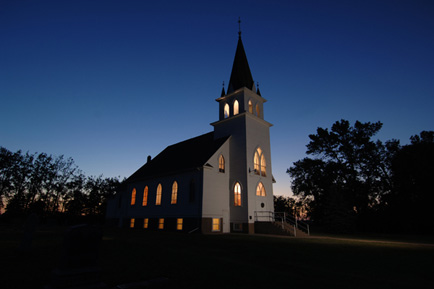 Singsaas Lutheran Church, Hendricks, MN voted to end its affiliation with the ELCA on January 17, 2010. (Photo courtesy of Jay Nelson) One church that has chosen to split from the ELCA is the 136-year-old Singsaas Lutheran Church in Hendricks, Minn. On January 17, 2010, more than two-thirds of the congregation voted to end its affiliation with the ELCA. Congregant Jay Nelson says they've been gaining congregants ever since. "One to two years ago, our congregation size had dwindled and our attendance bottomed out on some winter Sundays. On these Sundays we had just three, five or seven people attending. Our average attendance had been about 18. We now regularly have around 11 kids attending Sunday School and 60 attending our services. "The ELCA decision forced us individually to be either politically correct or Biblically correct. It caused many people to change churches and affiliations. And for the most part, most people are happier in their new church homes." |
Alice Reuter
Woodbury, Minn. "I became frustrated with divisiveness, and wanted community." |
↓ Commentary
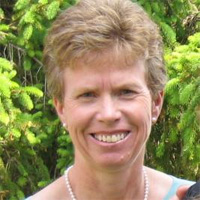 Alice Reuter (Photo courtesy of Alice Reuter) After a year of contention, this Lutheran longed for community, by Alice Reuter Last summer, when the ELCA national assembly passed resolutions in support of people in committed same-sex relationships and opened a path for them to take a place on the roster of ordained clergy, I was at my 40-year high school reunion. My high school was Augustana Academy, a private Lutheran school that chose to embrace inclusivity decades ahead of its time. We had no TVs at our reunion, but were eagerly checking our BlackBerrys in anticipation of the vote. I was not anticipating the reaction my own congregation of 28 years would have to the vote. The next month, my church held a forum for members of the congregation to discuss their personal beliefs about the resolutions that passed. I spoke up about my positive experiences with GLBT clergy, my feeling that it is time to offer support and understanding to all GLBT members and their families, and the need to welcome diversity in the church. I was saddened by comments made at that forum that did not reflect any understanding or compassion for GLBT issues. Two weeks later, at the beginning of a worship service, the president of our church council announced that our congregation was withholding funds from the ELCA while this issue was studied. The pastor then preached a sermon about our new mission to reach out to the world. I was so upset about the contrast between these two messages that, in the front row of the choir, I started crying and could not stop. I walked out during the sermon and did not return to my church for two months. During those two months, I attended a different Lutheran church and tried to learn all I could to support what I felt in my heart. I read several books on sexual orientation and the church, attended an interfaith dialogue presenting differing viewpoints, and talked with many who shared or disagreed with my thinking. I also received a card asking me to return to my church and stand with those who remained. Some people said that they were scared to speak up in that church environment. Eventually, I realized I needed to return. I began worshiping at my church again and attended the church council meetings for the next six months. I felt a responsibility to continue to advocate for these changes at my church, but I recognized changes in my own spiritual life that meant it was time to find a new church home. I found myself checking the website to see who was preaching on a given Sunday. I became frustrated with divisiveness, and wanted community. I also started to realize that I could no longer respect a diversity of beliefs on this issue, so my desire to see support for a diversity of beliefs would no longer work for me either. I needed to move forward, in an environment that supported my Christian beliefs. I wanted a spiritual home where the leadership staff openly supported the changes in the ELCA, and I found not one, but two. I am joining one of them as a full member, and the other as an associate member. It was hard to leave behind a Christian community that had been so important to me, but in the process I have made many new Christian friends. I also connected with some who had also transferred from other churches for the same reason. Finally, I felt understood. I wish this transition had been easier for the ELCA, but the difficulties of my journey, which pale in comparison to the journeys of those more personally affected, have enriched my life. |
Gloria Owens
Fountain Hills, Ariz. "I have done a lot of meditation, prayer, and personal private retreats to say goodbye to what was. I have had to let go." |
↓ In their words
 Gloria and Evan Owens (Photo courtesy of Gloria Owens) Gloria and Evan Owens have been married 52 years, and worshipped together at Shepherd of the Hills in Fountain Hills, Ariz. until February 21, 2010. That's when the congregation voted to leave the ELCA. Evan stayed, Gloria bolted with 40 percent of the congregation to create a new church community they call New Journey Lutheran Church. "My husband felt like I abandoned him. I left Shepherd of the Hills Lutheran Church after the congregational meeting on February 21. I knew my staying would not enable me to worship faithfully and knew I had to leave. When we left the meeting I told him I was leaving. He did not tell me personally he felt abandoned but told a close friend mine. "At first, whenever we discussed the issue we would become angry. Then we didn't discuss it at all for awhile. The hardest part for me was most of our friends are of the LCMC (Lutheran Congregations in Mission for Christ) view and I felt like the 'lone wolf' in the pack. However, I told him I could not leave because of how the ELCA has impacted my life being an Associate in Ministry, involved in Global Mission, and Women of the ELCA and the opportunities that I have had within the church. "The most difficult thing is we have only one car and we have to work out how each of us can both worship on Sunday. I take him to church, he gets a ride home, then I drive 26 miles one way to church. Even though New Journey Lutheran Church is just forming, and they meet on Saturday evenings, I choose to also worship on Sundays. With New Journey meeting on Saturday evenings at 6:30 p.m. it affects what we do when invited out by friends to dinner and I am the one who misses church. Our new church is looking into ways we can be a worshipping community. Those members that left were mostly couples and they are aware that I left with my husband staying. They comment how well I have handled this situation but they see how difficult it has been for me. "I am a spiritual director and I also go to a spiritual director and peer supervision group. They have been my listening ear and helping me to process. I have done a lot of meditation, prayer, and personal private retreats to say goodbye to what was. I have had to let go. What I have discovered is I have been empowered because I stood up for what I believe and took action on it. Since leaving in February the church that I worship at on Sunday mornings has asked me to preach on three different occasions and that was empowering. I am supported by pastors and friends on the ELCA side and that has been good." |
In The Spotlight
-
The Current Music Blog
Your daily note for good music, news and pop culture. With attempted jokes.


